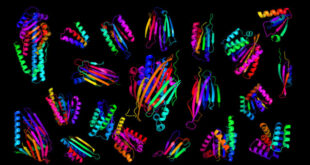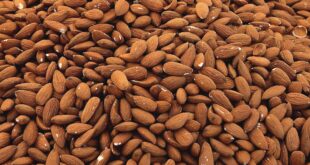Two cups (330 grams) of mangoes a day have beneficial effects on systolic blood pressure and gut fermentation among healthy postmenopausal women, according to a study presented this week at Nutrition 2018, the American Society for Nutrition’s annual meeting.
Mangoes are rich in mangiferin, a phenolic acid that has multiple bioactive effects. Image credit: Li Wan Chun.
“This is the first study to demonstrate positive vascular effects of mango intake in humans,” said study senior author Dr. Robert Hackman, a researcher in the Department of Nutrition at the University of California, Davis.
“Our results build on previous animal and cell studies that point to the potential benefits of mangoes to promote health.”
Mangoes contain a mix of polyphenols, including mangiferin, quercetin, gallotannins, and gallic acid, that have been the focus of previous investigations exploring the potential health-protecting properties of mangoes.
Dr. Hackman and co-authors believe the concentration of these bioactive compounds in mangoes may be responsible for the favorable response.
In the study, 24 healthy postmenopausal women consumed 330 grams of honey mango (also referred to as Ataulfo) daily for 14 days. This popular variety was chosen for the study due to the high concentration of polyphenols.
Following the 14 days of mango consumption, the participants resumed their normal daily diet but eliminated mango intake for 13 days.
Measurements were taken during each visit, including heart rate and blood pressure, blood samples and breath samples, which are increasingly used in nutrition studies to evaluate gut health status.
“At the start of the study, blood pressure was not significantly different between visits,” the researchers said.
“Yet once mango was consumed, systolic blood pressure was significantly lower two hours after mango intake compared to baseline values. Pulse pressure was also significantly reduced two hours after eating mango.”
Breath levels of hydrogen and methane were also measured, which reflect the amount of these gases that were produced due to microbial fermentation in the intestinal tract.
“Some study participants produced hydrogen, some produced methane, and others produced both gases or neither of them,” the study authors said.
“Six of the 24 participants produced methane, and of these six, three shown significant reduction after consuming mango, which is considered a favorable outcome for gut health.”
_____
Xiang Li et al. Effects of Two Weeks of Daily Mango Fruit Intake on Vascular Function, Blood Pressure and Gut Fermentation in Healthy Adult Women. Nutrition 2018, abstract # P08-065
 #Bizwhiznetwork.com Innovation ΛI |Technology News
#Bizwhiznetwork.com Innovation ΛI |Technology News




